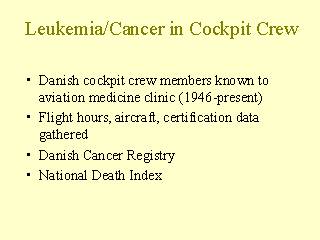Increased exposure to cosmic radiation in flight crew gives concern of health effects primarily in two domains; pregnancy and the development of cancers. Epidemiologic studies of the impact of long-term exposure to cosmic radiation must deal with several underlying issues. First, the measurement of exposure to radiation may be difficult. Estimates of exposure, though, have been gathered from flight records and details regarding the type of aircraft flown. Levels of exposure, over time, though, may be low and require large numbers of participants to achieve appropriate statistical power. Third, there are questions about what an appropriate control group might be. Selection bias into flight occupations may influence the study, for example.
This slide illustrates one recent study of cancers in cockpit crew members in Denmark. Data were gathered from an airline medical clinic over time and matched to flight records, cancer registry data, and death data.
See: Boice JK, Blettner M, Auvinen A. Epidemiologic Studies of Pilots and Aircrew. Health Physics 79(5):576-584, 2000.
Gundestrup M, Storm HH. Radiation-induced acute myeloid luekemia and other cancers in commercial jet cockpit crew: a population-based cohort study. Lancet 354:2029-31, 1999.















